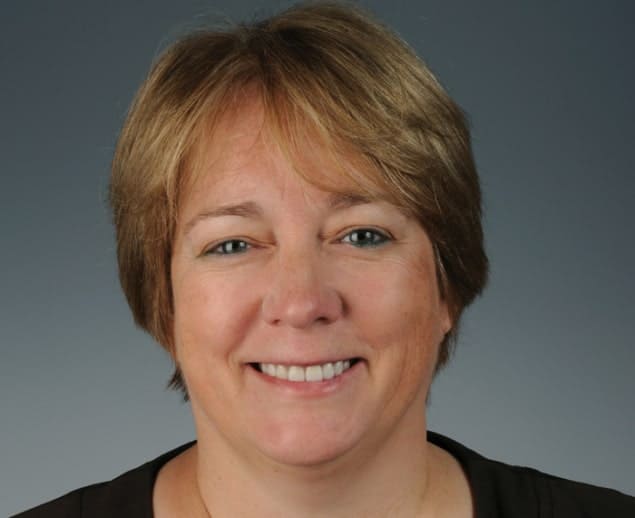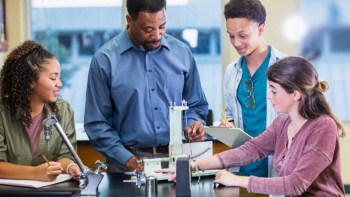Sightsavers chief executive and physics graduate Caroline Harper earned an OBE for her services to the gas industry before changing careers to work in the not-for-profit sector. In this interview, she speaks to Margaret Harris about the devastating impact of blinding trachoma, impostor syndrome and how her father’s death gave her the courage to take a risk

Why did you decide to study physics?
It was fairly straightforward. I did maths, physics and chemistry at A-level partly because they were my strongest subjects, and partly thanks to the influence of my father, who said that science would always get you a good job. Then, when it came time to move on to university, I was just better at physics – I can’t say I had a huge desire to study the subject! But there were parts of physics that I really enjoyed, and I think I’d enjoy studying it much more now than I did when I was very young and it was all about passing exams.
How did you get into the energy industry?
I had done a “science and society” project on future energy issues as an undergraduate at the University of Bristol, so when I saw that Cambridge’s Cavendish Laboratory had a research group devoted to energy studies, it really attracted me. As part of my PhD in the group, I studied the residential energy market, so it seemed logical for me to move into the industry after I finished. Initially, I didn’t get the right job – I misread a job advert and thought it was more senior than it was – but I tried some different ones and eventually I moved into commercial negotiation for British Gas. My career really took off from there.
You became the first managing director at Amerada Hess Gas. What was that like?
I’d been doing commercial negotiation around gas purchasing and transportation, so when I was headhunted to start Amerada’s retail gas business from scratch, it was a big jump. Initially I was going to turn it down; I spoke to my father about it and he said he wasn’t sure I could really do it. But then, just as I was about to say “no”, my father died, and it was one of those moments where you think, “What am I afraid of, here?” If it’s not a great success, I’ll learn from that, but if I say no I’ll never know what I would have been capable of. So, oddly enough, his death sparked a flame of ambition in me, and I said yes. I guess it taught me to go out and pursue opportunities as they arise, and I’ve done that ever since.
How did you get to be chief executive at Sightsavers?
After we sold Amerada Hess Gas, I did some travelling and I decided that I would like to get into the not-for-profit sector. I thought it would be difficult to do that with my private-sector CV, so I applied to be a non-executive director of my local housing association in Notting Hill, London, because I thought it would give me useful experience (which it did). Then a few years later, Sightsavers advertised for a chief executive role and it was just one of those things where, very occasionally, you see something and you think, “That’s what I want to do.” I had blindness in my family (my father and uncle were both blind before they died), so it had some personal resonance for me. I didn’t actually think I’d get the job because I had so little experience either in international development or in the charity world, so I was hugely pleased when I got it.
That’s the second time you’ve mentioned feeling unqualified to do something. Are you prone to impostor syndrome?
I think so, occasionally. You sort of think, “My goodness, am I really doing this?” But since my father died, one of the things I have consciously done is that even if I think, “Oh, they won’t want me, I couldn’t possibly,” I make myself do it and that’s stood me in good stead. And I think women are particularly prone to it – there’s that classic story of how women will look at a job advert where there are six requirements and think, “Oh, I can’t do that because I only meet five of them”, whereas a bloke will say, “I meet three out of six, I’ll give that a go”. I’ve seen that in some of the women I’ve worked with and I’ve encouraged them not to be held back by it.
What’s been the biggest challenge for you in changing sectors?
In my first year, there was some resistance from some members of staff along the lines of “What could a woman coming from the oil and gas industry possibly know about development work?” I had to prove myself, and it took a while to do that, since you can’t do it like they tell you to do it in the private sector. There, the assumption is that as a chief executive, you have 90 days to get in there and stamp your authority on the organization. In this sector, unless you’re dealing with a financial crisis, that kind of behaviour would be regarded as much too corporate. So in the beginning, you have to make changes incrementally. Then as you establish yourself, listen to people and experience things, you can make more and more change, such that now I’m eight years in I’m making more radical change in our organization than ever. I’ve tried to speed up decision-making, for example, and to bring in new staff so that we’ve got a balance between people who are experts in the development field and people who bring more corporate skills such as project management. It’s important to maintain the balance between passion and professionalism in an organization like this; people primarily come to work for you because they want to make change in the world, but it’s also important to recognize that you need discipline to make sure that when you’ve committed to a donor to deliver a project, you deliver it when you said you would.
What are you working on at the moment?
We’ve got a very big push on tropical diseases, particularly trachoma, which is actually chlamydia in the eye. What happens is that people get infected as young children, over and over again, and their eyelids start turning inside out. Then the eyelashes scrape the cornea, which is absolutely agonizing, and they go blind. We are aiming to eliminate blinding trachoma from all the countries where we work by 2020. We’re in discussions with the Queen’s Diamond Jubilee Trust and also the UK Department for International Development (DFID) about a major grant that would be a huge scale-up for us, enabling us to work in collaboration with a range of other agencies across the world as well as the health ministries of various countries. That’s probably our most exciting project. Certainly for me, personally, the idea of helping to eliminate a disease from the world – and it’s not just trachoma, there’s several that we work on, including one called river blindness – I can’t really think of anything more exciting in terms of a legacy.
There’s been some controversy about the amount the UK spends on foreign aid recently. What’s your view on that?
There’s a classic saying that “charity begins at home”, but the fact is that 99.3% of the money the UK government spends is not related to foreign aid or development. Also, the cost-effectiveness of some of the things we do – whether it’s distributing drugs for trachoma and river blindness, or doing cataract operations, which cost something like £25 or £30 depending on what country you’re in – is incredible. I’ve been to hospitals in places like Mozambique and seen the impact on an old person who can see their kids again, and perhaps the girl who was forced to stay home from school can now get back to school because granny can see. You look at that and you think, actually, that’s not a lot to spend. And although you see a lot of negative coverage in the papers about foreign aid, if you look at something like Comic Relief, you’ll see that it produces an outpouring of money, mainly for Africa, in record amounts every year. That, and the fact that our own donations are increasing, suggests to me that this rejection of supporting people in poorer countries is not as widespread as the media says.
Any advice for today’s students?
Keep your options open and don’t assume that you have to follow an obvious treadmill, or that the first job you get is the one you have to do for life. And there’s one other thing, particularly for women. When I was studying physics, we were very much the minority, and I remember being really quite intimidated when some of my male classmates would go around saying, “Oh, these exams, they’re so easy it’s an insult to my intelligence.” I found them quite difficult, and I remember being really worried – only to discover that a lot of the guys who had been going around boasting actually didn’t do very well at all, whereas I did fine. So don’t be intimidated if you’re in the minority. You’re just as good as they are.


